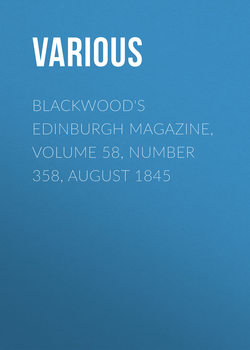Blackwood's Edinburgh Magazine, Volume 58, Number 358, August 1845

Реклама. ООО «ЛитРес», ИНН: 7719571260.
Оглавление
Various. Blackwood's Edinburgh Magazine, Volume 58, Number 358, August 1845
ON PUNISHMENT
PÚSHKIN, THE RUSSIAN POET
No. III
MARSTON; OR, THE MEMOIRS OF A STATESMAN
PART XVIII
A LETTER FROM LONDON
PRIESTS, WOMEN, AND FAMILIES
MY COLLEGE FRIENDS
No. II
ZUMALACARREGUI
NORTH'S SPECIMENS OF THE BRITISH CRITICS
No. VII
Отрывок из книги
We trust our readers will not blame us for the slightness of construction and unimportant subjects of many of the minor pieces which we have admitted into our present selection from Púshkin's lyrical productions. It was our object to give the English reader, as far as possible, a fair and just notion of the poet's peculiar turn of thought and style of expression; and to do this completely, it appeared to us indispensable to avoid confining our choice—however natural it might have seemed, and however great the temptation to do so—to the more ambitious and elaborate efforts of his genius. The true principles of criticism have long ago established the doctrine, that the composition of a beautiful song, or even of a perfect epigram, deserves to be considered as difficult a task, and as rare an achievement, as the production of an ode or of an elegy; and though it may be objected that, for the purposes of translation, the song is generally much more ungrateful than the more imposing production, yet we could not consider ourselves as fulfilling our promise, (of holding up to our countrymen a faithful mirror of Púshkin's poetry,) had we omitted to attempt versions of the slighter and more delicate productsof his poesy. It is true that, in passing through the deteriorating process of translation into another language, the lighter works suffer most, and are more likely to lose that exquisite delicacy of expression, and that transparent colouring of thought, which is the more peculiar merit of the song or the fugitive poem—these tender blossoms run much more risk of losing, in short, their finer and more evanescent aroma, than the more gorgeous flowers of the tropical regions of poetical imagining; but at the same time it must be remarked, that the danger in such experiments is not on the side of the author, but wholly on that of the translator. That we have determined—rashly, perhaps—to encounter this danger, must be our apology for having introduced into our collection many of the shorter and slighter pieces which will be found in these pages, and, among them, the specimen which we are now about to present.
The following lines (which are not without a kind of fantastic prettiness of their own) do not seen to need any remark or explanation, unless it be the circumstance of the poet's qualifying the sky of St Petersburg with the epithet of pale-green. It may be observed that this peculiar tint (exactly enough expressed by the adjective) has struck almost all the strangers who have visited the northern capital, and has been repeatedly noticed by travellers; as, for instance, Kohl, Custine, &c. &c. Our readers will find the singular colour of the St Petersburg atmosphere (particularly observable in the winter, or at night) very well described in Sir George Lefevre's amusing "Notes of a Travelling Physician." This greenish tint is as peculiar to the banks of the Neva, as is the reddish-black to the neighbourhood of Birmingham or the Potteries; or the yellowish-brown (in November—"let rude ears be absent!") to the environs of the Thames:—
.....
Perhaps our readers would like to see a Russian Sonnet. To many the name of such a thing will seem a union of two contradictory terms; but, nevertheless, here is a sonnet, and not a bad one either.
The last production which we shall present in our present bundle of samples, selected from Púshkin's lyrics, is the irregular ode entitled André Chénier. This composition is founded upon one of the most well-known and tragic episodes of the first French Revolution: the execution of the young and gifted poet whose name forms the title of the lines. The story of Chénier's imprisonment and untimely death, as well as the various allusions to the beautiful verses addressed by him to his fellow-prisoner, La Jeune Captive, to his calm bearing on the scaffold, and to the memorable exclamation which was made in the last accents ever uttered by his lips; all these things are, doubtless, sufficiently familiar to our readers; or, if not, a single reference, either to any of the thousand books describing that most bloody and yet powerfully attractive period of French history—nay, the simple turning to the article Chénier, in any biographical dictionary, will be amply sufficient to recall to the memory the principal facts of the sad story which Púshkin has made the subject of his noble elegy. It will be therefore unnecessary for us to detail the life and death of the hero of the poem, and we shall only throw together, in these short preliminary remarks, the few quotations and notes appended by the Russian poet to his work. These will not be found of any very formidable extent; and as the poem itself is not of a considerable length, we trust that the various passages, which these quotations are adduced to illustrate, will be sufficiently perceptible, without our submitting to the necessity of appending them in the form of marginal annotations or foot-notes, a necessity which would force us to load the text with those unsightly appendages to books in general, and to poetry in particular—the asterisks and daggers of marginal reference.
.....